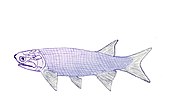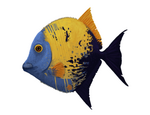Dapediidae
| Dapediidae Temporal range:
| |
|---|---|

| |
| Fossil specimen of Dapedium politum | |

| |
| Artist's reconstruction of Sargodon | |
| Scientific classification | |
| Domain: | Eukaryota |
| Kingdom: | Animalia |
| Phylum: | Chordata |
| Class: | Actinopterygii |
| Infraclass: | Holostei (?) |
| Order: | †Dapediiformes Thies & Waschkewitz, 2016 |
| Family: | †Dapediidae Lehman, 1966 |
| Genera | |
Dapediidae is an extinct family of neopterygian ray-finned fish that lived from the Middle Triassic to Late Jurassic (Ladinian to Tithonian).[2] It is the only family of the order Dapediiformes. Its members were historically placed within the ginglymodian family Semionotidae, but were moved to their own family in 1966, and subsequently to the separate order Dapediiformes in 2016.[3]
Description
[edit]Dapediids had deep, laterally flattened circular bodies covered in thick ganoid scales, which gave them a resemblance to the pycnodontiforms, a group they may or may not be related to.[4] Their teeth were adapted towards a durophagous diet; some dapediids fed on hard-shelled invertebrates,[5] while at least one genus (Hemicalypterus) may have been herbivorous.[6]
Classification
[edit]Dapediids are usually considered to be either basal ginglymodians[3][6] or stem group representatives of the wider clade Holostei,[4][7] but some studies have found them to be early-diverging stem-teleosts instead.[4]
References
[edit]- ^ Gouiric-Cavalli, Soledad; Iglesias, Ari; Cariglino, Bárbara; Reguero, Marcelo A. (2024). "A Late Jurassic deep-bodied actinopterygian fish from Antarctica". Acta Palaeontologica Polonica. 69 (3): 467–483. doi:10.4202/app.01158.2024.
- ^ Cawley, John J.; Marramà, Giuseppe; Carnevale, Giorgio; Villafaña, Jaime A.; López‐Romero, Faviel A.; Kriwet, Jürgen (February 2021). "Rise and fall of †Pycnodontiformes: Diversity, competition and extinction of a successful fish clade". Ecology and Evolution. 11 (4): 1769–1796. doi:10.1002/ece3.7168. ISSN 2045-7758. PMC 7882952. PMID 33614003.
- ^ a b Thies, D.; Waschkewitz, J. (2016). "Redescription of Dapedium pholidotum (Agassiz, 1832) (Actinopterygii, Neopterygii) from the Lower Jurassic Posidonia Shale, with comments on the phylogenetic position of Dapedium Leach, 1822". Journal of Systematic Palaeontology. 14 (4): 339–364. doi:10.1080/14772019.2015.1043361. S2CID 130282395.
- ^ a b c Latimer, A. E.; Giles, S. (2018). "A giant dapediid from the Late Triassic of Switzerland and insights into neopterygian phylogeny". Royal Society Open Science. 5 (8): 180497. Bibcode:2018RSOS....580497L. doi:10.1098/rsos.180497. PMC 6124034. PMID 30225040.
- ^ Smithwick, F. M. (2015). "Feeding ecology of the deep-bodied fish Dapedium (Actinopterygii, Neopterygii) from the Sinemurian of Dorset, England". Palaeontology. 58 (2): 293–311. Bibcode:2015Palgy..58..293S. doi:10.1111/pala.12145. S2CID 86168055.
- ^ a b Gibson, S. Z. (2016). "Redescription and Phylogenetic Placement of †Hemicalypterus weiri Schaeffer, 1967 (Actinopterygii, Neopterygii) from the Triassic Chinle Formation, Southwestern United States: New Insights into Morphology, Ecological Niche, and Phylogeny". PLOS ONE. 11 (9): e0163657. Bibcode:2016PLoSO..1163657G. doi:10.1371/journal.pone.0163657. PMC 5033578. PMID 27657923.
- ^ López-Arbarello, A.; Sferco, E. (2018). "Neopterygian phylogeny: the merger assay". Royal Society Open Science. 5 (3): 172337. Bibcode:2018RSOS....572337L. doi:10.1098/rsos.172337. PMC 5882744. PMID 29657820.





